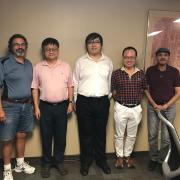Congratulations to Chenfei for passing his Ph.D defense; Welcome to the Doctors' Club!
2019
LASER SURFACE PROCESSING FOR ANTICORROSION OF MARINE-GRADE 5XXX ALUMINUM-MAGNESIUM ALLOYS
Abstract of thesis:
The 5xxx series aluminum-magnesium (Al-Mg) alloys, with their superior mechanical and corrosion properties, are of great importance for the construction of marine facilities and vessels. However, sensitization of Al-Mg alloys with β-phase precipitation on grain boundaries occurs under exposure to elevated temperatures, resulting in extreme susceptibility to intergranular corrosion (IGC) and stress corrosion cracking (SCC). Laser surface processing techniques are promising candidates to reverse the sensitization as well as improve the corrosion resistance of Al-Mg alloys. Therefore, the research efforts described in this dissertation mainly focus on anticorrosion laser techniques including: 1) bulk laser desensitization, 2) laser surface desensitization, and 3) fiber laser shock peening. The first two techniques are for reversing the sensitization in Al-Mg alloys, while the third can be used for preventing the generation of SCC.
- Bulk laser desensitization: Sensitized 5456/5083 Al-Mg alloys were heated to a specific temperature using a continuous fiber laser for a certain time to reverse the sensitization. Complete desensitization, preservation of the mechanical property, and improvement in the resistance to further sensitization were investigated after bulk laser desensitization. The mechanism of bulk laser desensitization was investigated and analysed.
- Laser surface desensitization: Surface overheating for a short time period with no melting was realized by fiber laser scanning/irradiation, which successfully desensitized localized surface layers of sensitized Al-Mg alloys with controllable depths. Complete desensitization, preservation of the mechanical property, and improvement in the resistance to further sensitization were investigated after laser surface desensitization. Finite element simulation was conducted for transient laser surface desensitization. Laser shock peening was proved to compensate the tensile stress generated by laser surface desensitization.
- Fiber laser shock peening: A nanosecond fiber laser was evaluated for laser shock peening. A peening frequency of 1,000 Hz was achieved in area processing; and the effect of laser parameters, sacrificial layer thickness, and confining the water layer flow rate on the morphology, hardness, and residual stress were investigated.
